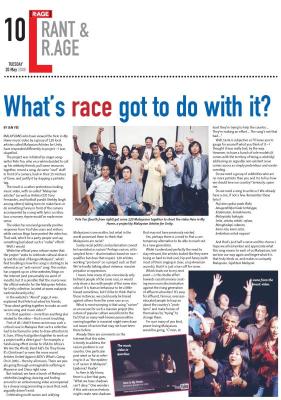By IAN YEE
alltherage@thestar.com.my
DURING my first few months as a journalist, I wrote probably the dumbest article of my life. Coming from me, I suppose that’s saying quite a lot about that piece.
It was about the Here In My Home music video, which local singer-songwriter Pete Teo had put together with some well-known Malaysian personalities. Being young, obnoxious and rather fond of the sound of my own words, I decided to write an opinion piece about how the whole project reeked of pretentiousness.
Looking back, I’ve come to realise it was I who was being pretentious. I was too eager to impress, too eager to go against the grain, too eager to shoot my mouth off so everyone would know how clever I could be.
Fortunately for me, the backlash I got was pretty mild considering how plain and horribly wrong the article was. I don’t think I got anything right in over 800 words – the tone was unnecessarily antagonistic, I had done no research or interviews to qualify any of my statements, and I just generally made myself sound like a proper idiot.
It was every journalists’ worst nightmare. You spend hours upon hours obsessing over a story, crafting every paragraph, every word, every thought until everything on the screen is just a blur of random letters strung together; only to find that you had completely lost your way AFTER the story was published. No amount of cringing over the paper the next day can change anything.
That’s certainly how it felt for me with my Here In My Home story. I was so caught up in my own thoughts and opinions, so busy trying to make myself sound clever, after a while I simply neglected to apply that basic human trait so crucial to good journalism – empathy.
I always tell the newer writers in the R.AGE team that you have to be a little crazy to be a journalist, because we dedicate our whole lives to telling other people’s stories. Our job requires us to be passionate about someone else’s life, to find out what they think and believe in, and suppress our own judgement (and trust me, we are a very critical sort) lest it clouds our objectivity.
So if you asked me, empathy is a pretty crucial trait for those in our profession. A good journalist should be able to put him or herself in the shoes of the people they are writing about, whether it’s a victim of a crime, or a group of local celebrities filming a music video to foster national unity.
Five years ago, I had to learn all that the hard way.
When the first emails came in from the readers (social media still wasn’t really big back then), I was defiant. I thought the people complaining about my story were just mindless drones who would fall in line behind any cause that had a celebrity leading it.
It took me about a week to finally realise just how knuckle-headed I had been. Some of the people who were involved in the project were gracious enough to reach out and engage in a bit of discourse with me about the project, and it totally changed my perspective. Everything I wrote in that story was horribly skewed and completely unfair. What they were trying to do was good. End of. I was just too stupid to see it.
The good thing was I learnt the importance of sticking to good old fashioned journalistic principles, and I was able to learn it early on in my career. Always do your research, always conduct proper interviews, always maintain objectivity, and never, NEVER lose your sense of empathy.
One shouldn’t underestimate the power of the written word. It can inspire (something which we hope to do through our anti-bullying campaign which we will be launching in the next few weeks), and it can hurt. I mean, just look at how much anger and resentment a simple Facebook status can cause.
But if there’s one thing I learnt after my dumbest article ever, it’s that there really are no benefits in losing your sense of empathy.
What do you think about this story? Tweet your thoughts to @thestar_rage.


Tell us what you think!